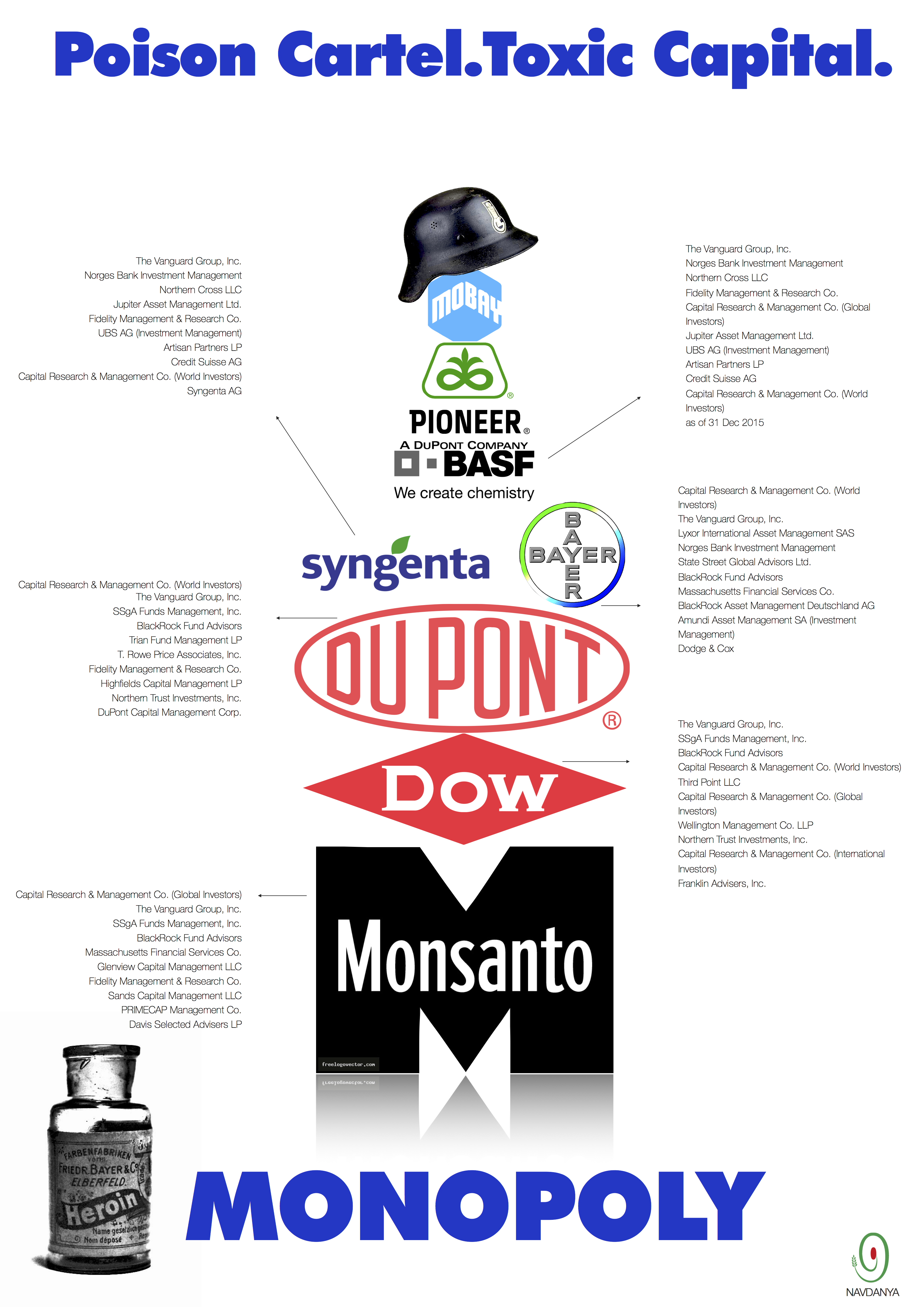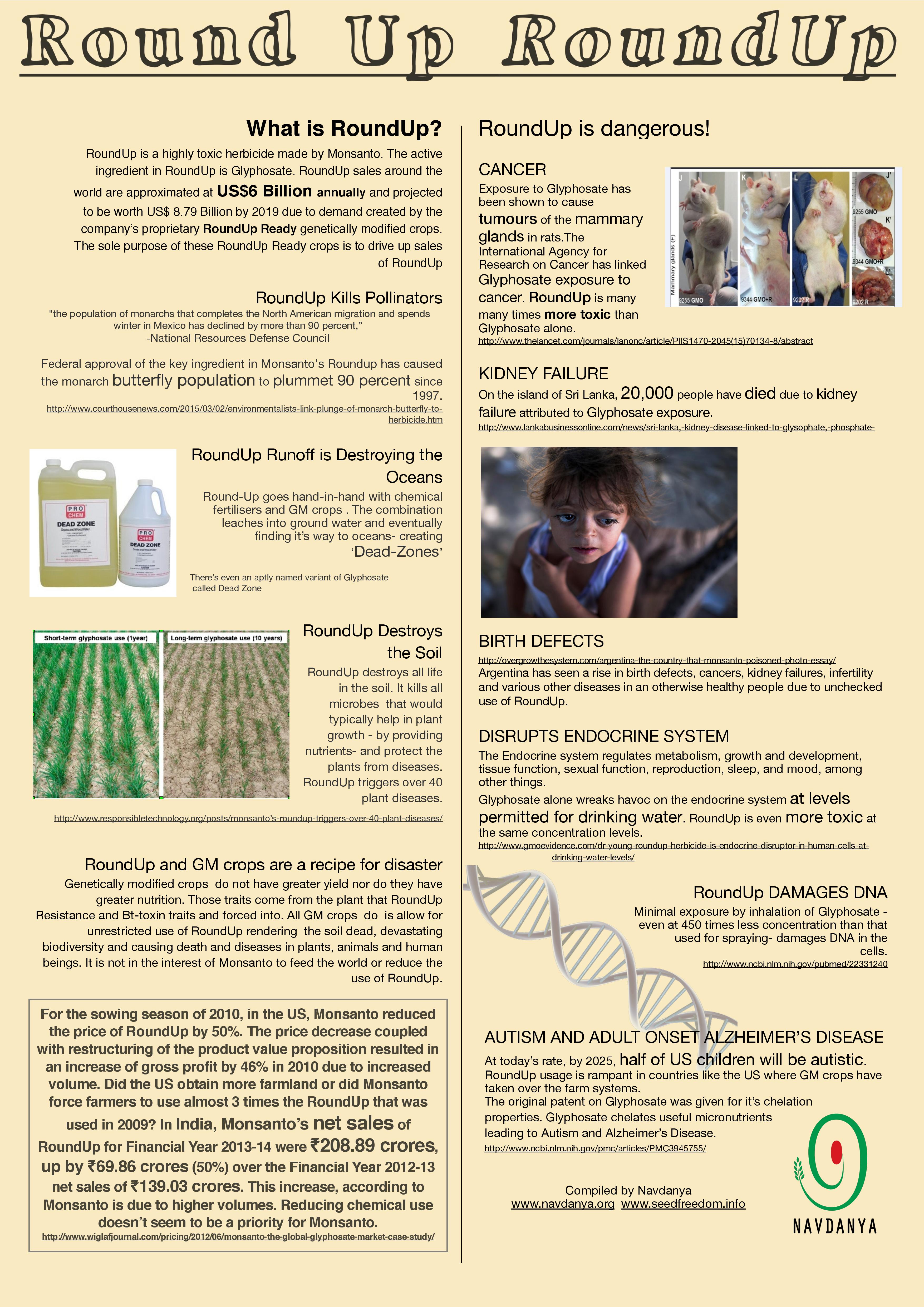In just 100 years, the chemicals and technologies of war-based conglomerates, which produced and profited from the chemicals that killed millions of people during the two world wars, have continued their destruction, wiping out millions of species by spreading poisonous agrichemicals, destroying our fragile ecosystems, poisoning our soils and entire web of life, undermining every aspect of our lives for financial profit. They have enlarged their empires and established monopolies through free trade neoliberal policies and deregulation of commerce, broadening their control over our lives. They are attacking life on earth and biodiversity and threatening farmers’ rights to seed and people’s rights to affordable medicine through patents and intellectual property rights (IPRs).
The “Big 6” chemical and GMO corporations that own the world’s seed, pesticides and biotechnology industries are now enlarging their empire with mega buyouts. Syngenta has merged with ChemChina ($43 billion deal). Dow Chemical, which bought up Union Carbide responsible for the Bhopal disaster killing over 20,000 people, has merged with Dupont ($122/130 billion deal) while Bayer has merged with Monsanto (over $63 billion deal).
In this scenario, just 3 companies are left in control of 60% of the world’s seeds and 70% of the chemicals and pesticides.
Through these aggressive mergers and acquisitions they are expanding their markets, and, by directly targeting decision-makers, increasing their influence and pressure on governments and institutions. Through wide public relations and propaganda they are undermining science – to ensure that health and environmental regulations do not interfere with their profit making activities, thus increasingly leading to the erosion of our democratic principles. By expanding their monopolies on seed and food, chemicals and medicines, they deepen their control over our food and health, with the burden of this system falling most heavily on the smallest farms and the poorest consumers.
The entire industrialization of food, agriculture and life is based on the false claim of feeding the world, when the reality is that an agriculture that has been shaped by the war industry is at the root of the hunger and malnutrition in the world. While competition is the rhetoric of free trade agreements, monopoly is the outcome and as such they are destroying diversity, pluralism and democracy, the systems that protect our food, health and livelihoods. The toxic agenda of the war-based corporations and all-powerful foundations is based on false claims of innovation and invention of our seed, our heritage and life on earth, attempting to hijack governments, and assailing those that refuse to buckle.
Both the agrarian crises and the health and malnutrition crises are rooted in the rules of free trade in WTO allowing seed monopolies and dumping of toxic and inferior fake food and junk food. Each of us is affected whether we be farmers or consumers, rural or urban, young or old, women or men.
In India, the corporate controlled debt creating agriculture has triggered a suicide epidemic among Indian farmers. More than 300,000 farmers have committed suicide in India since 1995 – most of them in the Bt cotton areas.
We are dealing with a destructive force that is taking out life forces wherever it can: If the corporations have their way our fragile web of life will be poisoned and broken, the diversity of species will be driven to extinction, and people will lose all freedoms to their seed, to their food, to their knowledge, decisions and choices.
The work of Navdanya in the last 30 years has been about uncovering the underlying lies of the green revolution, backed by the richest corporations of the world, including the real aim of megamergers and free trade agreements, clearly in the direction of profit at any cost and the opening of more and more markets through lobbying pressure on the democratically elected politicians for the elimination of regulatory barriers.
In October 2016, Navdanya co-organised, along with multiple civil society organizations, the Monsanto Tribunal and the People’s Assembly in The Hague. The process of holding the “Poison Cartel” accountable for its crimes is the culmination of 30 years of scientific, legal, social, and political work by movements, concerned citizens and scientists.
The judges’ conclusions were presented in April 2017 and underscored the need to assert the primacy of international human and environmental rights law and to make the question of ecocide to the centre of discourse for making corporations accountable for crimes against the environment.
The People’s Assembly was a gathering of leading movements and activists working to defend our ecosystem and food sovereignty, to lay out the effects of the agrichemical industry on the planet and on our lives, as well as to share independent studies and real experiences of farmers and consumers across the world and chart the road to our future based on Seed Freedom and Food Freedom, agroecology and farmers rights, our commons and economies of sharing, rights of nature and Earth Democracy.
The global mobilization which culminated with the People’s Assembly and the Monsanto Tribunal continued throughout 2017 through a number of actions in Greece, France Germany and Italy – among others – shaping a future that is GMO free, poisons free, fossil fuel free, patent free, “free trade“- free, and free of corporate control.
In India, Navdanya has also been challenging the process of the Monsanto-Bayer merger, as well as the Dow Dupont merger. As the Competition Commission of India rejected the Monsanto-Bayer merger application. Navdanya also sent a letter to the CCI warning them about the existing conflict of interest with CropLife which submitted the complete data for the evaluation of the Dow / Dupont merger.
It is incumbent upon us to free ourselves and all the other more vulnerable species of our Earth family from the threats of the Poison Cartel and claiming the power back into the hands of the farmers, as well as promoting the alternatives that are actually in the hands of rural communities.
As part of the Planetary Alliance for Earth Democracy we shall continue to resist attempt of these poison makers to control our food, our life and democracy. Farmers all over the world are realising the reality of what is happening, and they are organizing and fighting back. They are claiming back their seeds, their lands, their traditional knowledge and implementing ecological agriculture based on preserving biodiversity and soil fertility.
Also read:
The Corporate War Against The Planet, People and Democracy – A Century of Ecocide and Genocide
Posters
Poison Cartel Mergers Deals:
- Syngenta & ChemChina ($43 billion) –
- Dow Chemical & Dupont ($130 billion deal) –
- Bayer & Monsanto ($57 billion)
Glyphosate use since its introduction:
According to a 2016 study by Charles M. Benbrook
- 56% of the world’s total glyphosate used is applied to GM crops
- Glyphosate based herbicides resistant crops globally account for 80% of the 120 million hectares of GM crops grown annually
- In the USA: 90% of soy and 70% of maize and cotton are glyphosate tolerant
- Increase of glyphosate use in the USA: from 0.8 million pounds (1974) to 250 million pounds, 67 % of which occurred in just the last 10 years
Herbicide resistant GMO crops: a failed technology
- Weeds in RoundUp Ready crops fields have gradually developed resistance to the herbicide. In the USA 92% of RR cotton and soybeans are infested by uncontrolled spread of “superweeds” like amaranth.
- Farmers have started to switch to more powerful and more toxic products, like a combination of glyphosate and 2,4-D active substance produced by Dow AgroSciences and/or to Monsanto’s Xtend ™ crops, reistant to both glyphosate and Dicamba
- Dicamba based herbicides have caused a widespread problem caused by the product’s volatility. Damages to neighbouring soybean fields, as well as other crops and vegetation are being investigated in 17 States on a 2.5 million acres area.
Impact on Environment – Residues in water
- A recent US Geological Survey study sampled waterways in 38 states and found glyphosate and AMPA in the majority of rivers, streams, ditches, and wastewater treatment plant outfalls tested.
Impact on Environment – Residues in Soil
- Studies in the US indicate glyphosate residues detected in soils of crop production fields range from 25 to 1000 μg kg-1 soil.
- Glyphosate tends to accumulate in soil as 95% is absorbed by the soil itself or by the roots of the plant, while only 5% gets to the targeted weed.
- According to a European pilot study on soil contamination by the Joint Research Centre of the European Commission and Wageningen University 45% of agricultural land in Europe contains glyphosate and AMPA, the most stable degradation product of glyphosate.
Impact on Health
- Pesticides are responsible for the deaths of two hundred thousand people each year, of which 99% from countries of the Global South, as outlined in the latest report by the United Nations Special Rapporteur on the Right to Food, Hilal Elver.
- Glyphosate was found in the urine of 93% of consumers undergoing toxicological investigation during the project, launched in 2015, by the University of San Francisco – California (UCSF).
- The social economic cost of the impact of neurological issues linked to pesticides use, such as lower IQS caused by prenatal exposure to agrochemicals amounts to 125bn per year, according to a study promoted by the European Union on the impact of organic food and agriculture on human health.
- Roundup has been also linked to ‘chronic kidney disease of unknown etiology’ (CKDu) in Sri Lanka, India and Central America. In Sri Lanka, it has today become the most significant public health problem with more than 60,000 estimated patients and more than 20,000 deaths.
Corporate Crimes – The hidden truth
- Toxicity risk assessments of many chemical substances have been hidden from the public since the 1920s, by producers and regulatory agencies, as revealed in the “POISON PAPERS”: more than 20,000 documents released at the end of July 2017 by the Center for Media and Democracy and the Bioscience Resource Project.
- According to an investigation by Corporate Europe Observatory in June 2017, about 46% of the experts on the scientific panels of EFSA have a direct or indirect financial conflict of interest with the agribusiness industry.
- The Monsanto Papers contain hundreds of internal emails of Monsanto, as well as its correspondence with US Federal Agencies, the content of which reveals the magnitude of collusion between Monsanto and the EPA in order to undermine the investigation of the potential hazard of Glyphosate for human beings, including ghostwriting some studies fraudulently attributed to apparently independent academics.
We don’t need poisons to feed the world – All scientific evidence is showing that small biodiverse ecological farms are more productive than large farms based on monocultures, chemicals and GMOs:
- The International Assessment of Agriculture Knowledge , Science and Technology (IAASTD’s Agriculture at a Crossroads report, vol. V) has clearly shown that small agroecological farmers are more productive.
- The UNCTAD Trade and Environment Review 2013 Titled “Wake Up Before it is Too Late” stresses that a paradigm shift is needed from chemical intensification to ecological intensification .
- The United Nations Environment Programme in “Preventing Future Famines” shows how small ecological farms enhance productivity through ecological functions.
- Lancet , the leading medical journal has recognized that only small farms have diversity , and diversity is vital for health.
- As Navdanya’s work over the last 3 decades has shown we can grow enough nutrition for two times the current population (Health per Acre), we can increase farmers’ incomes tenfold by giving up expenses for buying toxic chemicals (Wealth per Acre), we can address malnutrition and chronic diseases (Annam:Food As Health), and we can create climate resilience (How Biodiversity and Agroecology create Climate Resilience).


